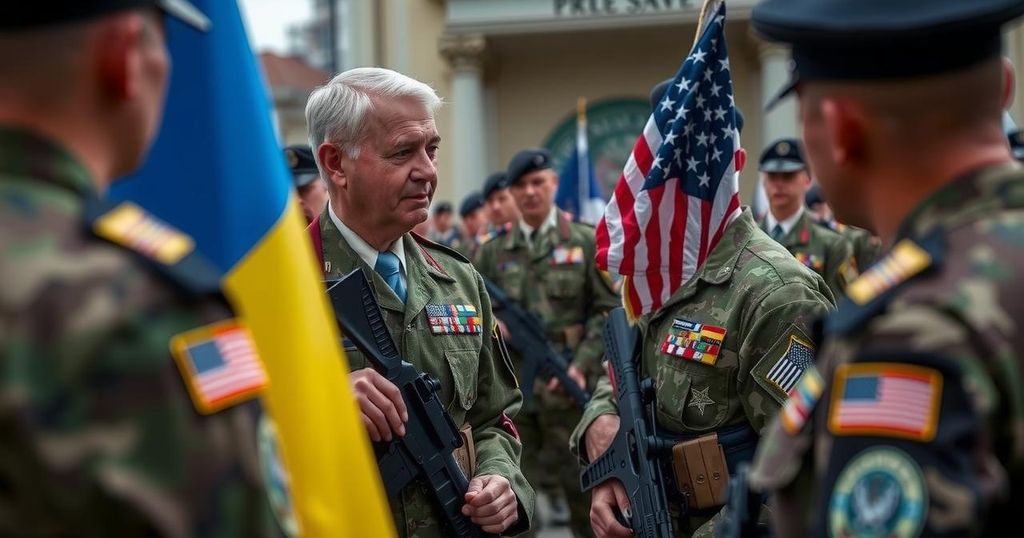Secretary of Defense Lloyd Austin Visits Ukraine Amid Growing Challenges

Secretary of Defense Lloyd Austin visited Ukraine to discuss military aid and support amidst ongoing Russian advances and the uncertainty of U.S. assistance due to the upcoming presidential elections. His discussions with Ukrainian leaders focus on military support, the resilience of Ukraine’s defense, and the implications of potential changes in U.S. political leadership.
Secretary of Defense Lloyd Austin commenced his visit to Ukraine on Monday morning, amidst the backdrop of ongoing Russian military advances and the impending U.S. presidential elections which pose uncertainty regarding future U.S. assistance to Ukraine. During his stay in Kyiv, Austin is scheduled to engage in discussions with Ukrainian President Volodymyr Zelensky and Defense Minister Rustem Umerov. They will address Ukraine’s military requirements and strategies for sustaining U.S. support for the upcoming year, as articulated by the Secretary prior to his arrival. The Secretary’s trip is described by defense officials as a significant opportunity to reflect on the trajectory of the U.S.-Ukraine partnership over the past two and a half years of conflict. However, it is crucial to recognize that this meeting will not serve as a celebration of success, given the challenging circumstances Ukraine faces as winter approaches. Despite extensive sanctions levied against Russia and significant military aid from the U.S. and its allies, Russian forces continue to make incremental territorial gains. Reports from Kyiv indicated loud explosions early Monday morning, highlighting the ongoing threats faced by Ukrainian civilians as the conflict perseveres. Austin’s administration emphasizes the establishment of multinational coalitions as a critical achievement, particularly through the Ukraine Defense Contact Group, comprising 57 nations and the European Union, which he initiated shortly after the war began. He underscored the remarkable resilience of the Ukrainian forces, attributing their capacity to sustain their defense to the considerable support received from international partners. However, concerns loom over the potential repercussions of a future Donald Trump administration, with uncertainty surrounding U.S. support for Ukraine being a major factor. Trump has expressed ambivalence about Ukraine’s prospects, describing President Zelensky in disparaging terms, further complicating the bipartisan consensus on military aid in Congress. As Austin arrived, he engaged with a country deeply entrenched in conflict, where President Zelensky remains resolute in not surrendering territory to Russia and advocates for Ukraine’s NATO membership as a pivotal aim for securing a victorious outcome. Notably, NATO is unlikely to grant Ukraine membership while it remains in active conflict. While Austin acknowledges that Ukraine has thwarted many of Russia’s strategic objectives, he did not provide a clear vision for a decisive Ukrainian victory. Reports indicate that Russian forces maintain a considerable advantage in terms of manpower and ammunition, bolstered by military support from Iran and North Korea. In contrast, Ukraine, benefitting from sophisticated weaponry provided by the West, is better positioned than a year ago. Nevertheless, the U.S. continues to restrict the provision of long-range missiles to Ukraine, which are deemed essential by Zelensky for conducting operations deep within Russian territory. Austin expressed confidence that allies would persist in bolstering Ukraine, regardless of changes in U.S. political leadership. He mentioned upcoming military systems that would soon contribute to Ukraine’s defense efforts.
The article highlights Secretary of Defense Lloyd Austin’s visit to Ukraine amid significant geopolitical challenges, particularly the ongoing war with Russia and the uncertain political landscape in the United States. As military dynamics evolve, Austin’s discussions with Ukrainian officials will focus on military support and cooperation between the U.S. and Ukraine. The implications of the U.S. presidential elections on foreign policy and bipartisan support for Ukraine are also assessed, particularly in the context of potential shifts in leadership.
In conclusion, Secretary of Defense Lloyd Austin’s visit to Ukraine underscores the complex interplay between military support, international alliances, and evolving political dynamics in both Ukraine and the United States. The unwavering resolve of Ukrainian leaders to reclaim their territory and the significant challenges posed by Russian aggression highlight the critical need for sustained U.S. support. As the global strategic landscape remains uncertain, it is crucial for both American officials and international partners to ensure continued aid and cooperation to uphold Ukraine’s defense efforts.
Original Source: www.cnn.com








